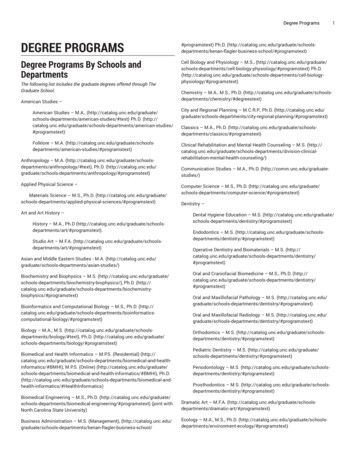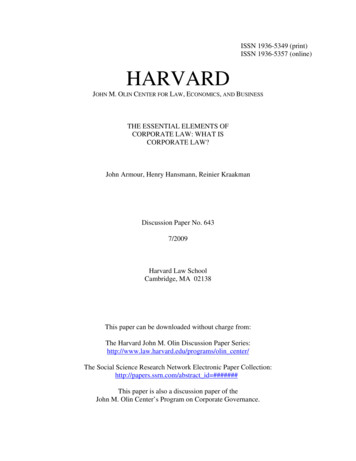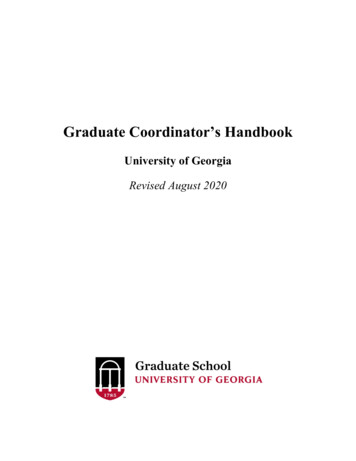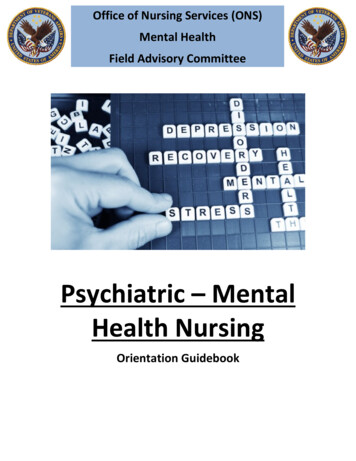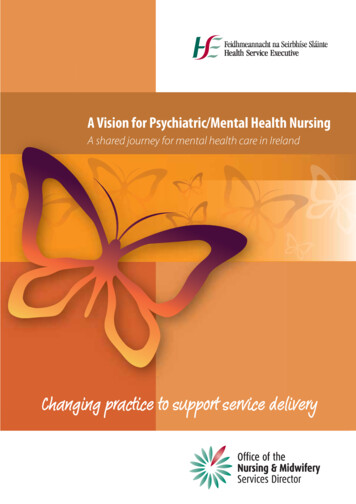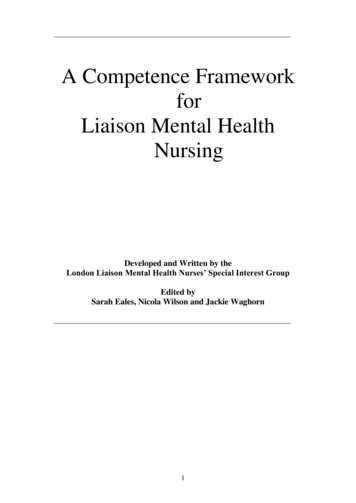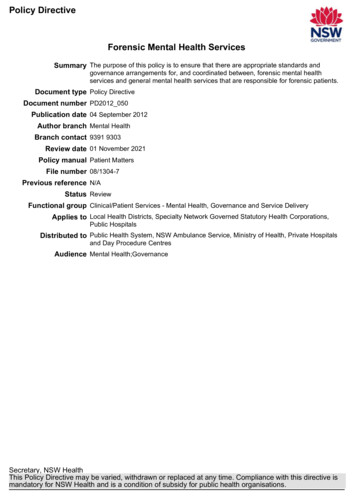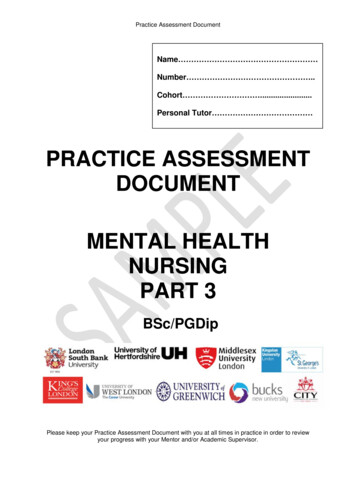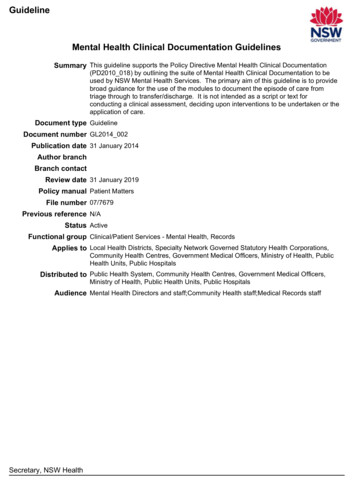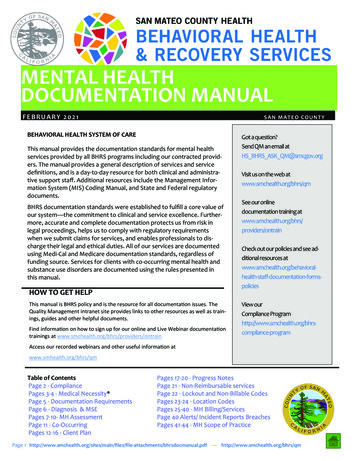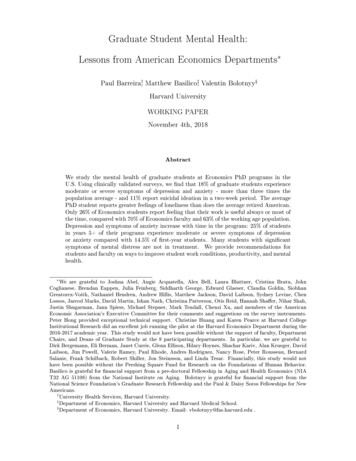
Transcription
Graduate Student Mental Health:Lessons from American Economics Departments†‡ Paul Barreira, Matthew Basilico, Valentin BolotnyyHarvard UniversityWORKING PAPERNovember 4th, 2018AbstractWe study the mental health of graduate students at Economics PhD programs in theU.S. Using clinically validated surveys, we nd that 18% of graduate students experiencemoderate or severe symptoms of depression and anxiety - more than three times thepopulation average - and 11% report suicidal ideation in a two-week period. The averagePhD student reports greater feelings of loneliness than does the average retired American.Only 26% of Economics students report feeling that their work is useful always or most ofthe time, compared with 70% of Economics faculty and 63% of the working age population.Depression and symptoms of anxiety increase with time in the program: 25% of studentsin years 5 of their programs experience moderate or severe symptoms of depressionor anxiety compared with 14.5% of rst-year students. Many students with signi cantsymptoms of mental distress are not in treatment. We provide recommendations forstudents and faculty on ways to improve student work conditions, productivity, and mentalhealth.We are grateful to Joshua Abel, Angie Acquatella, Alex Bell, Laura Blattner, Cristina Bratu, JohnCoglianese, Brendan Eappen, Julia Feinberg, Siddharth George, Edward Glaeser, Claudia Goldin, SiobhanGreatorex-Voith, Nathaniel Hendren, Andrew Hillis, Matthew Jackson, David Laibson, Sydney Levine, ChenLossos, Jarrod Marks, David Martin, Ishan Nath, Christina Patterson, Otis Reid, Hannah Sha er, Nihar Shah,Justin Shugarman, Jann Spiess, Michael Stepner, Mark Tendall, Chenzi Xu, and members of the AmericanEconomic Association's Executive Committee for their comments and suggestions on the survey instruments.Peter Hong provided exceptional technical support. Christine Huang and Karen Pearce at Harvard CollegeInstitutional Research did an excellent job running the pilot at the Harvard Economics Department during the2016-2017 academic year. This study would not have been possible without the support of faculty, DepartmentChairs, and Deans of Graduate Study at the 8 participating departments. In particular, we are grateful toDirk Bergemann, Eli Berman, Janet Currie, Glenn Ellison, Hilary Hoynes, Shachar Kariv, Alan Krueger, DavidLaibson, Jim Powell, Valerie Ramey, Paul Rhode, Andres Rodriguez, Nancy Rose, Peter Rousseau, BernardSalanie, Frank Schilbach, Robert Shiller, Jon Steinsson, and Linda Tesar. Financially, this study would nothave been possible without the Pershing Square Fund for Research on the Foundations of Human Behavior.Basilico is grateful for nancial support from a pre-doctoral Fellowship in Aging and Health Economics (NIAT32 AG 51108) from the National Institute on Aging. Bolotnyy is grateful for nancial support from theNational Science Foundation's Graduate Research Fellowship and the Paul & Daisy Soros Fellowships for NewAmericans.†University Health Services, Harvard University.‡Department of Economics, Harvard University and Harvard Medical School. Department of Economics, Harvard University. Email: vbolotnyy@fas.harvard.edu . 1
1 Executive SummaryThe objectives of the study were to (1) understand the prevalence and severity of mentalhealth issues in Economics PhD programs; (2) understand what students are thinking, feeling, and experiencing during their programs; (3) understand how the thoughts, feelings, andexperiences are related to student mental health; and (4) make recommendations on stepsprograms can take to improve student mental health.The 8 programs participating in thestudy were: Columbia University, Harvard University, University of Michigan, MassachusettsInstitute of Technology (MIT), Princeton University, UC Berkeley, UC San Diego, and YaleUniversity.Below, we summarize our main ndings for each objective.1.1 Prevalence and Severity of Mental Health Issues About 18% of students are experiencing moderate to severe symptoms of depression andanxiety.The comparable national rate for depression is 5.6% and 3.4-3.6% for thoseaged 25-34 (Kocalevent et al. (2013)).A study of the German population found thecomparable national rate for anxiety to be 5% (Lowe et al. (2008)). 11% of students (56 people) reported having suicidal thoughts on at least several dayswithin the last two weeks. 25% of students have at some point in their lives been diagnosed with a mental healthissue by a professional. 13% were diagnosed before starting the PhD program, 12% werediagnosed after. Of those experiencing moderate to severe symptoms of depression, only 27% are currently receiving treatment for depression. 21% of those experiencing moderate to severesymptoms of anxiety are receiving treatment for anxiety, and only 27% of those whohave contemplated suicide in the last 2 weeks are receiving any form of mental healthtreatment. The prevalence of depression and anxiety symptoms among Economics PhD students is2
comparable to the prevalence found in incarcerated populations. Loneliness and isolation are major issues.The average Economics PhD student feelsconsiderably lonelier and more isolated than a retired American. Women and international students have a higher prevalence of mental health issues thanmen and U.S. students, respectively. The majority of those who are currently receiving mental health treatment are notexperiencing moderate or severe symptoms of anxiety or depression.In other words,contrary to social stigma, seeing a mental health professional is not the same thing ashaving poor mental health. Many of those who seek help are doing better than thosewho do not. Although students generally have a good understanding of whether their own mentalhealth is good or poor, they overestimate how well they are doing relative to otherstudents. For example, of those who reported suicidal thoughts in the last two weeks,26% thought their mental health was better than average.1.2 Student Experiences in Their Programs Economics students have biggest regrets about how they organize their time and howthey engage with their studies.This is in contrast to natural science PhD students,whose biggest regrets are their area of study and their advisers. Only 26% of Economics students report feeling like their work is useful always or mostof the time, compared to 70% of Economics faculty and 63% of the entire working agepopulation. Only 19% of Economics students feel that they have opportunities to makea positive impact on their community or society compared to 58% of faculty and 53% ofthe population. 62% of students worry always or most of the time about work when not working, compared to 60% of faculty members. 20.5% of students nd themselves too tired for activities in private life always or most of the time, compared to 23% of faculty.3
13% of students said they seriously contemplated quitting the PhD program once in thepast 2 weeks, with an additional 9.5% considering doing so over two or more days. While 96% of students say they met with their main adviser at least once in the last2 months, students report fear of making a bad impression, doubt about the quality oftheir thoughts and ideas, and lack of progress since the previous meeting as the biggestimpediments to meeting with advisers more frequently. Many students report being unable to be honest and open with their advisers aboutthe di culties they are experiencing. Ordered by the gap between desired honesty andactual honesty, from largest to smallest, the top 5 issues are: (1) non-academic careeroptions, (2) preparing for the job market, (3) research progress, (4) issues with otheradvisers, (5) issues arising from co-authorship with the faculty member. Few students feel comfortable raising their hand in a seminar setting.Only 19% ofwomen would be comfortable doing so, compared to 35% of men. No gap exists betweenU.S. and international students. There is a lack of options for students when they are experiencing an issue with advising.Only 42% say they would know where to turn for help with advising if an issue arose. 16% of students have experienced some form of sexual harassment in their departmentsince becoming a PhD student. 21.5% of women have experienced sexual harassment compared to 13% of men; 21% ofU.S. students, compared to 11% of international students. 62.5% of the instances of sexual harassment were perpetrated by another graduate student, while 19% came from a professor.1.3 Mental Health and Student Experiences Older cohorts have worse mental health than younger cohorts. 14.5% of the rst-yearstudents are experiencing moderate to severe symptoms of depression and anxiety, com-4
pared to 25% of those who are in years 5 in their program.Similarly, 7% of therst-year students report contemplating suicide in the last 2 weeks, compared to 13% ofthose in years 5 . 27% of those who said they regret doing the PhD and 20% of those who regret theirchoice of advisers report contemplating suicide in the last 2 weeks. In contrast, thosewho wish they had engaged more with their studies and organized time more e ectivelyhave substantially lower rates of suicidal ideation (11%). 7% of students who said theyhave no regrets about graduate school contemplated suicide in the last 2 weeks. Students who perceive their peers as competitive, who do not have very good friends inthe department, and who in general do not have many people with whom they can openlydiscuss their private feelings without having to hold back have worse mental health. The size of one's problem set group in the rst year and whether or not a student coauthors with other students or faculty are not correlated with our measures of depressionor anxiety. Students who have larger study groups and who do co-author are, though,less likely to feel lonely and isolated. Mental health issues do not appear to be a ecting students with di erent values in lifedi erently. In particular, students who believe that tenure at an academic institutionis very important for their success in life are not more or less likely to have mentalhealth issues than students who believe that income or recognition or a family are veryimportant for success in life. Having sources of meaning and usefulness appears to be crucial to mental health. Thosewho have goals to aspire to, feelings of doing useful work, sense of accomplishment, andopportunities to make a positive impact on their surroundings have better mental healththan those who do not.At the same time, when work fatigue and worries negativelya ect activities in private life, mental health is worse as well. Those with worse mental health also have worse performance.5They are less likely
to voice a thought in a seminar, slightly more likely to have worse rst-year grades,and substantially more likely to be seriously contemplating leaving the program. Theyare also more pessimistic about how well they have done and will do in their courses,teaching, presentations, and research. Students who talk to faculty that care about their success and care about them as aperson have better mental health than students who do not. The frequency with which students meet with their main adviser or with faculty morebroadly is not correlated with mental health. Students who say they avoid meetings with faculty because those meetings are unpleasanthave worse mental health than students who do not feel that meetings are unpleasant.Students for whom fear of the consequences of a bad impression, or doubt about thequality of their work, or lack of progress since the previous meeting are viewed as bigimpediments to talking to faculty also have worse mental health than those studentswho do not have such impediments. While students who cannot honestly and openly discuss mental health with their adviser have worse mental health, it is also true that students who cannot openly discussproblems with presentations, teaching, research progress, preparing for the job market,considering non-academic jobs, etc. also have worse mental health. Whether a student went straight through from his or her undergraduate program intograduate school or whether a student took many or few math courses before graduateschool has no bearing on that student's mental health. A student's level of engagement with social media, measured in the number of times heor she checks Facebook per day, is also unrelated to mental health.1.4 Recommendations for Improvement Encourage students to take on research or activities that provide a sense of meaning andusefulness to them in the short term. Help students hedge against failure.6
Provide continuous engagement, making clear to students that someone cares about theirsuccess in the program. Measure success in di erent ways to lessen feelings of job insecurity. Support students inpreparing the best possible job market paper and dissertation regardless of the students'ambitions or career preferences. Communicate with students clearly and frequently. Encourage and empower student initiatives to improve work conditions and collegiality. Make the coursework years as useful and relevant to the research years as possible. Destigmatize conversations about failures, big and small. Destigmatize getting help. Create a channel through which faculty can receive constructive feedback on advising.Encourage students and advisers to have conversations about the kind of advising relationship they would like to have. If sensing that a student is having trouble, be patient, supportive, and empathetic.Follow up with the student to show you care and to ensure that the student is gettingthe support he or she needs. Know what resources are out there and help the studentaccess them. Discuss failure with advisees early on and commit to being their supportive adviser rstand their evaluator second. Use the data in this study to encourage students to access mental health resources.Partner with your university's counseling center to
a positive impact on their community or society compared to 58% of faculty and 53% of the population. 62% of students worry always or most of the time about work when not working, com-pared to 60% of faculty members. 20.5% of students nd themselves too tired for activ-ities in private life always or most of the time, compared to 23% of facult.y 3
